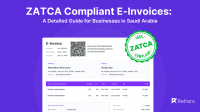E-invoicing is transforming global tax reporting as countries adopt digital systems to increase transparency and reduce fraud. From mandatory setups in Argentina and India to voluntary adoption in Andorra and Hong Kong, businesses worldwide are adapting to different e-invoicing rules.
This blog offers a clear, country-wise overview of key requirements and timelines, showing how nations are embracing this digital shift to streamline financial processes.
1. Albania

Albania has implemented a mandatory real-time e-invoicing system to modernize tax reporting. Businesses must declare all invoices to the General Directorate of Taxes. The system aims to improve tax collection, reduce fraud, and align with European Union standards. B2B e-invoicing became mandatory in July 2021 and B2C followed in September 2021.
Key Requirements:
- Mandatory for B2B and B2C.
- Invoices are validated through a Central Information System (CIS).
- Must be stored electronically for 5 years.
2. Andorra

Andorra operates a post-audit e-invoicing system where e-invoicing for B2B and B2G transactions is allowed but not mandatory. Integrity and authenticity are ensured through e-signature, EDI, or audit trails, with the buyer’s consent required.
Key Requirements:
- E-invoicing is allowed but not mandatory for B2B.
- E-signature, EDI, or Business Controls Audit Trail can be used to prove authenticity.
- Buyer’s consent is required.
- Invoices must be archived for 3 years from the chargeable event or tax obligation.
- Storage abroad is allowed, but any delay during a tax audit will be penalized.
3. Argentina

In 2024, Argentina updated its e-invoicing system, requiring SMBs to issue electronic credit invoices (FCE) for transactions with large companies, enhancing financing options. The threshold for mandatory invoicing was raised to $1,357,480 ARS, effective from April 2024.
Key Requirements:
- Mandatory for all businesses since 2015.
- Invoices must be submitted in XML format and include a scannable QR code.
- Must be stored for 10 years.
4. Australia

Australia’s e-invoicing system follows a post-audit model. E-invoicing is mandatory for B2G transactions through the PEPPOL network. The country is moving towards mandating B2B e-invoicing as well, with a phased rollout expected from November 2024.
Key Requirements:
- Mandatory for B2G via PEPPOL.
- B2B is to be phased in by 2025.
- Invoices are stored electronically for 7 years.
5. Austria

Austria has mandated e-invoicing for B2G transactions since 2014. The country uses the PEPPOL network for B2G invoices and is gradually moving towards expanding mandatory e-invoicing to other sectors.
Key Requirements:
- Mandatory for B2G transactions.
- Uses PEPPOL BIS 3.0 format.
- Invoices must be stored for 7 years.
6. Bahrain

Bahrain has implemented an e-invoicing system that follows a post-audit model. While e-invoicing is not mandatory for all businesses, Bahrain is working towards increasing digital adoption in tax reporting, particularly for VAT-registered businesses.
Key Requirements:
- Voluntary for B2B and B2G.
- Invoices must comply with VAT regulations.
- Archived for 5 years.
7. Belgium

Belgium is set to make B2B e-invoicing mandatory from January 2026. The country already requires e-invoicing for B2G transactions and is adopting the PEPPOL 4-corner model for seamless exchange.
Key Requirements:
- Mandatory for B2G; B2B mandatory from 2026.
- Format: PEPPOL BIS 3.0.
- Invoices must be archived for 7 years.
8. Benin

Benin has started exploring e-invoicing initiatives with a focus on improving tax collection and streamlining business processes. There is no mandatory system in place yet, but the government is considering future implementation.
Key Requirements:
- No mandatory e-invoicing currently.
- Focus on improving tax compliance.
- Likely future adoption of digital invoicing.
9. Bolivia

Bolivia has implemented a mandatory e-invoicing system for specific sectors starting in 2021. Businesses must register with the Servicio de Impuestos Nacionales (SIN) to issue digital invoices.
Key Requirements:
- Mandatory for certain sectors since 2021.
- Invoices must be validated by SIN.
- Must be archived for 5 years.
10. Botswana

Botswana has not implemented mandatory e-invoicing yet but is exploring options to modernize its tax collection processes with the potential for future e-invoicing requirements.
Key Requirements:
- No mandatory e-invoicing currently.
- Potential for future implementation.
- Likely focus on improving VAT collection and transparency.
11. Brazil

As a global leader in e-invoicing, Brazil’s mandatory e-invoicing system dates back to 2005. The country uses different formats including NF-e for goods and NFS-e for services. All invoices must be validated by the tax authority (SEFAZ) before being sent to customers.
Key Requirements:
- Mandatory for all taxpayers.
- Different formats for goods and services.
- Invoices archived for 5 years.
12. Bulgaria

Bulgaria has not yet mandated e-invoicing but allows businesses to use it voluntarily for both B2B and B2G transactions. The country follows the post-audit model where invoices must be stored for potential future audits.
Key Requirements:
- Voluntary for B2B and B2G.
- Invoices must be stored for 10 years.
- E-signature is required for integrity and authenticity.
13. Burundi

Burundi has not yet introduced mandatory e-invoicing, but the government is exploring the use of digital invoicing to enhance tax transparency and improve the efficiency of VAT collection.
Key Requirements:
- No mandatory e-invoicing system currently.
- Exploring options for future implementation.
14. Canada

Canada allows voluntary e-invoicing for both B2B and B2G transactions. While not mandatory, businesses are encouraged to adopt e-invoicing with a recommendation to follow the UBL format.
Key Requirements:
- Voluntary for B2B and B2G.
- UBL format recommended.
- Invoices must be stored for 6 years.
15. Chile

Chile is a global leader in e-invoicing, having mandated its use for all businesses since 2018. The system requires invoices to be submitted in XML format and validated by the tax authority (SII).
Key Requirements:
- Mandatory for all taxpayers.
- Invoices must be archived for 6 years.
- Requires QR code and validation by SII.

16. China

China has been progressively rolling out its e-invoicing system (e-fapiao) since 2020. While initially voluntary, e-invoicing is becoming mandatory for all businesses as part of the country’s digital transformation.
Key Requirements:
- Mandatory for new taxpayers, voluntary for others.
- Invoices must be validated and include a QR code.
- Must be stored for 10 years.
17. Colombia

Colombia’s e-invoicing system has been mandatory since 2019. It requires all businesses to issue electronic invoices validated by the tax authority (DIAN) before being sent to recipients.
Key Requirements:
- Mandatory for all taxpayers.
- Invoices are validated via DIAN and include a QR code.
- Archived for 5 years.
18. Costa Rica

Costa Rica made e-invoicing mandatory for all taxpayers in 2018. Businesses must submit invoices in XML format to the Dirección General de Tributación (DGT) for validation before sending them to customers.
Key Requirements:
- Mandatory for all taxpayers.
- Invoices must be digitally signed and validated by DGT.
- Must be archived for 5 years.
19. Croatia

Croatia introduced mandatory e-invoicing for B2G transactions in 2019 and is planning to extend this requirement to B2B transactions by 2026. The government’s e-Racun platform supports the digital invoicing process.
Key Requirements:
- Mandatory for B2G transactions since 2019.
- B2B was mandatory from 2026.
- Invoices stored for 11 years.
20. Cyprus

In Cyprus, the focus on e-invoicing has primarily been in the public sector. B2G e-invoicing is mandatory, but private-sector adoption remains voluntary. The government has taken significant steps to promote the use of digital invoices, making it easier for businesses to comply.
Key Requirements:
- Mandatory for B2G transactions.
- Voluntary for B2B.
- Invoices must be archived for 6 years.
21. Czech Republic

The Czech Republic has allowed businesses to use e-invoicing, but its adoption is voluntary. The country employs the ISDOC format for digital invoices, which is based on the UBL standard, ensuring easy interoperability with other European countries.
Key Requirements:
- Voluntary for B2G and B2B transactions.
- Format: ISDOC based on UBL.
- Invoices must be stored for 10 years.
22. Cuba

Cuba is exploring e-invoicing as part of its modernization of state-owned enterprises, although no mandatory system is in place yet. The government is studying the benefits of future implementation.
Key Requirements:
- No mandatory e-invoicing yet.
- Focus on the modernization of state-owned businesses.
- Likely future implementation.
23. Côte d’Ivoire

Côte d’Ivoire introduced mandatory e-invoicing in 2019, requiring VAT-registered businesses to submit invoices to the Direction Générale des Impôts (DGI) for validation.
Key Requirements:
- Mandatory for VAT-registered businesses.
- Invoices must be submitted for real-time validation.
- Must be archived for 10 years.
24. Denmark

Denmark was one of the first countries to implement mandatory B2G e-invoicing in 2005. In 2024, Denmark’s new Bookkeeping Act mandates digital bookkeeping for many businesses, with B2B e-invoicing expected to be fully enforced by 2026. The law sets the groundwork for mandatory e-invoicing, using the NemHandel platform and PEPPOL network to streamline tax reporting and improve efficiency
Key Requirements:
- Mandatory for B2G since 2005.
- B2B was mandatory from 2024.
- Invoices are stored for 5 years.
25. Dominican Republic

The Dominican Republic is moving swiftly towards mandatory e-invoicing, with the government recently passing legislation for its phased implementation. Large taxpayers will be the first to adopt the system, with smaller businesses to follow over the next few years.
Key Requirements:
- Mandatory for large taxpayers starting in 2024.
- Phased implementation over 3 years.
- Invoices are stored for 10 years.
26. Ecuador

Ecuador implemented mandatory e-invoicing for specific taxpayers in 2022. Invoices must be issued in XML format and digitally signed before being submitted to the tax authority (SRI) for authorization.
Key Requirements:
- Mandatory for specific taxpayers since 2022.
- Invoices must be archived for 7 years.
- Authorization code required from SRI.
27. Egypt

In 2024, Egypt expanded its e-invoicing system by making electronic receipts mandatory for more businesses, including B2C transactions. The system requires real-time validation by the Egyptian Tax Authority (ETA) to enhance tax compliance and transparency.
Key Requirements:
- Phased implementation started in 2020.
- Invoices must be submitted in XML format and validated by the Egyptian Tax Authority.
- Must be archived for 5 years.
28. El Salvador

El Salvador passed a law mandating e-invoicing for all taxpayers. The implementation will be phased, with larger taxpayers adopting it first. Invoices must be submitted to the tax authority for validation before being issued.
Key Requirements:
- Phased implementation starting in 2024.
- Invoices must be digitally signed and validated.
- Archiving for 10 years.
29. Estonia

Estonia, a digital leader, made e-invoicing mandatory for public sector suppliers in 2019 and plans to extend this to B2B transactions by 2025.
Key Requirements:
- Mandatory for B2G since 2019.
- B2B was mandatory from 2025.
- Invoices archived for 7 years.
30. Finland

Finland introduced mandatory e-invoicing for public sector suppliers in 2017 and allows private businesses to demand e-invoices. The country utilizes the PEPPOL network and is considering expanding mandatory e-invoicing.
Key Requirements:
- Mandatory for public sector suppliers.
- Format: PEPPOL BIS 3.0.
- Invoices archived for 6 years.

31. France

France has implemented mandatory e-invoicing for B2G transactions since 2020. The country is gradually moving towards making e-invoicing mandatory for B2B transactions by 2024. The goal is to streamline VAT collection and reduce fraud while aligning with EU-wide regulations.
Key Requirements:
- Mandatory for B2G and B2B by 2024.
- Invoices are validated through the Chorus Pro platform.
- Must be stored electronically for 6 years.
32. Germany

Germany will implement mandatory e-invoicing for B2B transactions starting January 2025. The phased rollout will require all businesses to adopt structured e-invoicing formats by 2028, starting with larger companies.
Key Requirements:
- Mandatory for B2G since 2020.
- B2B e-invoicing is being implemented by January 2025.
- Invoices must be stored for 10 years.
33. Ghana

Ghana launched its e-invoicing system in 2022, initially targeting large taxpayers. The system will be expanded in phases to include all businesses.
Key Requirements:
- Phased implementation starting in 2022.
- Invoices must be validated by the Ghana Revenue Authority.
- Archived for 6 years.
34. Greece

In 2024, Greece made e-invoicing via the myDATA platform mandatory for all businesses, with penalties for non-compliance. Additionally, e-delivery notes must be transmitted electronically from December 2024 to track goods shipments.
Key Requirements:
- Mandatory for B2G, voluntary for B2B.
- Invoices must be submitted to the MyData platform.
- Archived for 6 years.
35. Guatemala

Guatemala’s tax authority, SAT, has implemented the “Factura Electrónica en Línea” (FEL) system, making e-invoicing mandatory for all businesses. This system aims to improve fiscal transparency and increase tax compliance across various industries.
Key Requirements:
- Mandatory for all taxpayers.
- Invoices must be validated by the SAT using the FEL system.
- Must be stored electronically for 4 years.
36. Hong Kong

Hong Kong has yet to mandate e-invoicing, but many businesses have adopted it voluntarily as part of their digital transformation strategies. The government encourages businesses to use e-invoices to improve operational efficiency.
Key Requirements:
- Voluntary for B2B and B2G.
- No specific platform is mandated for e-invoicing.
- Invoices must be stored for 7 years.
37. Hungary

In 2024, Hungary will continue real-time invoice reporting through the RTIR system, with all B2B and B2C transactions reported in XML format to the Hungarian Tax Authority. The NAV Online 3.0 system streamlines e-invoicing by allowing reported XML files to double as e-invoices.
Key Requirements:
- Mandatory for all taxpayers since 2021.
- Invoices must be submitted to NAV within 24 hours.
- Stored for 8 years.
38. Iceland

Iceland has fully adopted e-invoicing for B2G transactions, with the implementation of PEPPOL as the standard platform for the exchange of invoices. The country is also encouraging private-sector businesses to adopt e-invoicing.
Key Requirements:
- Mandatory for B2G transactions.
- PEPPOL BIS 3.0 is the standard format.
- Invoices must be stored for 7 years.
39. India

In 2024, India introduced mandatory linking of e-invoices with e-way bills from March 1. A pilot for B2C e-invoicing will be rolled out, and a new Invoice Management System (IMS) will launch in October, improving invoice reconciliation.
Key Requirements:
- Mandatory for businesses with a turnover over ₹5 crore.
- Invoices must be validated by the Invoice Registration Portal (IRP).
- Must be archived for 8 years.
Learn more about e-invoicing in India>
40. Indonesia

Indonesia introduced a phased e-invoicing system in 2014, starting with VAT-registered businesses. The system requires invoices to be submitted to the Directorate General of Taxes (DGT) for validation.
Key Requirements:
- Mandatory for VAT-registered businesses.
- Invoices submitted to DGT for validation.
- Archived for 10 years.
41. Ireland

Ireland allows voluntary e-invoicing for both B2B and B2G transactions. The country follows a post-audit system where invoices can be archived and reviewed upon request.
Key Requirements:
- Voluntary for B2B and B2G.
- E-invoices must be archived for 6 years.
- No mandatory real-time reporting.
42. Israel

Israel is progressing towards e-invoicing, with plans to implement mandatory e-invoicing for both B2G and B2B transactions in the coming years. The country is adopting digital solutions to enhance tax collection and reduce administrative costs.
Key Requirements:
- Expected to be mandatory by 2025 for B2B.
- Invoices will be validated through a government-regulated platform.
- Must be stored for 7 years.
43. Italy

Italy has one of the most advanced e-invoicing systems in Europe, mandating it for both B2G and B2B transactions. All invoices must be transmitted through the government platform Sistema di Interscambio (SdI).
Key Requirements:
- Mandatory for B2G and B2B.
- Invoices must be stored for 10 years.
- Validated through SdI.
45. Japan

Japan is in the process of rolling out its Qualified Invoicing System (QIS), which will become mandatory in 2023. Businesses must issue invoices that comply with the new e-invoicing standards, which include a mandatory QR code for validation.
Key Requirements:
- Voluntary until 2023, mandatory after.
- E-invoices must include a QR code.
- Must be archived for 7 years.
46. Jordan

Jordan introduced a phased e-invoicing system in 2021, starting with large taxpayers. The system is expected to become mandatory for all businesses shortly.
Key Requirements:
- Phased implementation starting in 2021.
- Mandatory for large taxpayers.
- Archived for 5 years.
47. Kazakhstan

Kazakhstan has implemented a phased mandatory e-invoicing system beginning with VAT-registered businesses in 2021. Invoices must be submitted in real time for validation by the tax authority.
Key Requirements:
- Phased implementation for VAT-registered businesses.
- Invoices are validated in real-time.
- Archived for 5 years.
48. Kenya

Kenya introduced mandatory e-invoicing in 2020 for VAT-registered businesses. All invoices must be submitted to the Kenya Revenue Authority (KRA) for validation before issuance.
Key Requirements:
- Mandatory for VAT-registered businesses.
- Invoices validated by KRA.
- Archived for 5 years.
49. Kuwait

Kuwait is in the early stages of developing an e-invoicing system with plans for a phased rollout in the coming years.
Key Requirements:
- No mandatory e-invoicing yet.
- A future phased rollout is expected.
- Focus on tax collection efficiency.
50. Laos

Laos introduced a pilot e-invoicing system for large businesses in 2022. The system is expected to expand in the coming years to cover all businesses.
Key Requirements:
- The pilot program started in 2022.
- Expected future mandatory rollout.
- Must comply with VAT regulations.
51. Latvia

Latvia requires B2G e-invoicing through the use of the PEPPOL network. The country has aligned with EU regulations, making e-invoicing for B2B transactions optional but highly encouraged for businesses looking to improve efficiency.
Key Requirements:
- Mandatory for B2G transactions.
- Optional for B2B transactions.
- Invoices must be stored electronically for 5 years.
52. Lebanon

Lebanon has implemented a voluntary e-invoicing system, with the potential for a mandatory system in the future as part of its tax reform efforts.
Key Requirements:
- Voluntary e-invoicing currently.
- Future mandatory system under consideration.
- Archived for 5 years.
52. Libya

Libya has introduced a pilot e-invoicing system for large taxpayers, with plans to expand it across various industries over the coming years.
Key Requirements:
- Pilot program for large taxpayers.
- Future expansion is expected.
- Focus on improving tax transparency.
53. Lithuania

Lithuania has mandated e-invoicing for public procurement since 2020, to expand it to the private sector in the coming years. The country utilizes the PEPPOL network to facilitate the exchange of electronic invoices.
Key Requirements:
- Mandatory for B2G transactions.
- Optional for B2B.
- Invoices must be stored for 10 years.
54. Luxembourg

Luxembourg is a leader in e-invoicing in the EU, having mandated B2G e-invoicing and setting the stage for mandatory B2B e-invoicing by 2025. The country aims to simplify VAT processes and ensure compliance with EU standards.
Key Requirements:
- Mandatory for B2G transactions.
- B2B is mandatory by 2025.
- Invoices must be stored for 10 years.
55. Madagascar

Madagascar is moving towards e-invoicing to modernize its tax system, with a particular focus on reducing tax evasion. While not yet mandatory, the government is actively encouraging businesses to adopt e-invoicing as part of broader fiscal reforms.
Key Requirements:
- Voluntary for B2B and B2G.
- Future plans to mandate e-invoicing.
- Invoices must be stored for 10 years.
56. Malaysia

Malaysia introduced an e-invoicing system in 2024 with mandatory B2G invoicing and plans to expand to B2B transactions by 2025. The system uses the PEPPOL network for B2G transactions.
Key Requirements:
- Mandatory for B2G by 2024; B2B by 2025.
- PEPPOL-based system.
- Must be archived for 7 years.
57. Malta

Malta allows voluntary e-invoicing for both B2B and B2G transactions, with businesses encouraged to adopt digital invoicing to streamline their processes.
Key Requirements:
- Voluntary e-invoicing.
- Archived for 5 years.
- There is no mandatory system yet.
58. Mauritius

Mauritius introduced a pilot e-invoicing system in 2021 for large taxpayers, with plans to expand the system to more businesses in the future.
Key Requirements:
- Pilot program for large taxpayers.
- Future expansion is expected.
- Archived for 5 years.
59. Mexico

Mexico has a long-standing e-invoicing system that requires mandatory e-invoicing for all taxpayers. The country uses the CFDI system where invoices must be submitted to the tax authority SAT for validation before being issued.
Key Requirements:
- Mandatory for all taxpayers.
- Invoices validated through SAT.
- Must be archived for 5 years.

60. Moldova

Moldova has implemented a phased e-invoicing system for certain sectors. Businesses must submit their invoices for validation by the National Tax Authority.
Key Requirements:
- Phased implementation for specific sectors.
- Invoices must be validated.
- Archived for 5 years.
61. Morocco

Morocco has introduced phased mandatory e-invoicing, starting with large taxpayers in 2022. The system requires e-invoices to be submitted to the tax authority for validation.
Key Requirements:
- Phased implementation starting in 2022.
- Invoices must be submitted for real-time validation.
- Archived for 10 years.
62. Montenegro

Montenegro has started implementing e-invoicing for B2G transactions, with plans to extend this to B2B shortly. The government is actively working on creating a digital ecosystem to facilitate easier tax reporting and compliance.
Key Requirements:
- Mandatory for B2G since 2021.
- Invoices must be stored for 5 years.
63. Nepal

Nepal is exploring the implementation of e-invoicing, starting with large businesses. There is no mandatory requirement, but the government is moving toward a digital tax collection system.
Key Requirements:
- There is no mandatory e-invoicing yet.
- Focus on large taxpayers.
- Likely a future mandatory rollout.
64. New Zealand

New Zealand follows a post-audit system for e-invoicing, with voluntary adoption for B2B and B2G transactions. The country uses the PEPPOL network, and businesses are encouraged to adopt e-invoicing for efficiency.
Key Requirements:
- Voluntary for B2B and B2G.
- PEPPOL-based e-invoicing.
- Archived for 7 years.
65. Netherlands

The Netherlands has embraced e-invoicing for B2G transactions using the PEPPOL network. The country is gradually moving towards expanding e-invoicing to B2B transactions, making it easier for businesses to comply with tax regulations.
Key Requirements:
- Mandatory for B2G since 2017.
- B2B is optional but encouraged.
- Invoices must be stored for 7 years.
66. Nigeria

Nigeria introduced a phased e-invoicing system in 2022 for businesses in the oil and gas sector. The system is expected to expand to other industries.
Key Requirements:
- Phased implementation starting with oil and gas.
- Future expansion to all sectors.
- Must be archived for 5 years.
67. Norway

Norway introduced mandatory B2G e-invoicing in 2019 and is gradually expanding to include B2B transactions. The country’s system is based on the PEPPOL network for seamless cross-border transactions.
Key Requirements:
- Mandatory for B2G since 2019.
- PEPPOL-based system.
- Must be archived for 5 years.
68. Oman

Oman introduced mandatory e-invoicing in 2022 for large taxpayers, with plans to expand the system to smaller businesses in phases.
Key Requirements:
- Phased implementation starting in 2022.
- Archived for 5 years.
- Focus on VAT compliance.
69. Pakistan

Pakistan has introduced voluntary e-invoicing for certain industries, and the government is planning to make it mandatory in the future as part of its tax reforms.
Key Requirements:
- Voluntary e-invoicing currently.
- Future mandatory system expected.
- Archived for 5 years.
70. Panama

Panama has mandated e-invoicing for specific industries through its Sistema de Facturación Electrónica (SFEP). The government aims to eventually extend the requirement to all taxpayers as part of its efforts to modernize tax collection.
Key Requirements:
- Mandatory for certain sectors.
- Invoices must be validated through the SFEP.
- Invoices must be stored for 5 years.
71. Paraguay

Paraguay implemented a phased e-invoicing system in 2022 for large taxpayers. Businesses must submit their invoices for validation by the tax authority.
Key Requirements:
- Phased implementation for large taxpayers.
- Invoices validated in real-time.
- Archived for 5 years.
72. Peru

Peru made e-invoicing mandatory for large taxpayers in 2018 and gradually extended it to all businesses by 2021. Invoices must be submitted in XML format and validated by the tax authority.
Key Requirements:
- Mandatory for all businesses since 2021.
- Invoices must be digitally signed and validated.
- Archived for 5 years.
73. Philippines

The Philippines introduced a pilot e-invoicing system for large businesses in 2022 with plans to expand it to all VAT-registered businesses.
Key Requirements:
- Pilot program for large businesses.
- Future expansion to all businesses.
- Archived for 5 years.
74. Poland
Poland introduced mandatory e-invoicing for large businesses in 2021 and is set to expand the requirement to all companies by 2023. E-invoices must be submitted through the national KSeF platform for validation.
Key Requirements:
- Mandatory for large businesses since 2021.
- Invoices submitted through KSeF.
- Archived for 5 years.
75. Portugal

Portugal introduced mandatory e-invoicing for certain sectors in 2020 with plans to expand to all businesses. Invoices must be submitted through the government platform for validation.
Key Requirements:
- Phased implementation starting in 2020.
- Invoices are validated through the government platform.
- Archived for 10 years.
76. Qatar

Qatar is in the early stages of developing an e-invoicing system with plans to roll out mandatory e-invoicing in the future as part of its tax reform efforts.
Key Requirements:
- No mandatory e-invoicing yet.
- A future phased rollout is expected.
- Focus on VAT compliance.
77. Romania

Romania introduced a phased e-invoicing system in 2022, starting with high-risk sectors. Invoices must be submitted to the Romanian tax authority (ANAF) for validation.
Key Requirements:
- Phased implementation starting in 2022.
- Invoices submitted to ANAF for validation.
- Archived for 10 years.
78. Russia

Russia mandates e-invoicing for VAT-registered businesses. Businesses must submit e-invoices in XML format to the Federal Tax Service for validation.
Key Requirements:
- Mandatory for VAT-registered businesses.
- XML format invoices validated by the tax authority.
- Archived for 4 years.
79. Saudi Arabia

In Saudi Arabia, the phased implementation of mandatory e-invoicing began in 2021, requiring all businesses to issue electronic invoices. As of 2024, this includes incorporating a QR code on simplified invoices for easier verification and compliance. This approach aims to enhance transparency and streamline tax processes across the country.
Key Requirements:
- Mandatory for all taxpayers.
- Invoices must be submitted with a QR code.
- Must be stored for 10 years.
Learn more about e-invoicing in Saudi Arabia>
80. Serbia

Serbia has implemented mandatory e-invoicing for B2G transactions and is in the process of expanding it to B2B transactions. The government’s goal is to improve tax collection and reduce the administrative burden on businesses.
Key Requirements:
- Mandatory for B2G since 2021.
- Invoices are stored electronically for 10 years.
- Expansion to B2B is in progress.
81. Slovenia

Slovenia has adopted mandatory e-invoicing for B2G transactions, utilizing the PEPPOL network for public procurement. The government is working towards expanding this requirement to private sector transactions to further reduce tax evasion.
Key Requirements:
- Mandatory for B2G since 2019.
- PEPPOL BIS 3.0 is the standard format.
- Invoices must be stored for 10 years.
82. Singapore

Singapore follows a voluntary e-invoicing model based on the PEPPOL network. Businesses are encouraged to adopt e-invoicing for both B2B and B2G transactions.
Key Requirements:
- Voluntary for B2B and B2G.
- PEPPOL-based system.
- Archived for 5 years.
83. Slovakia

Slovakia introduced mandatory e-invoicing for B2G transactions in 2021. The country plans to expand e-invoicing to B2B transactions by 2023.
Key Requirements:
- Mandatory for B2G since 2021.
- B2B e-invoicing was mandatory by 2023.
- Archived for 10 years.
84. South Africa

South Africa has introduced a voluntary e-invoicing system with plans to implement mandatory e-invoicing for VAT-registered businesses in the future.
Key Requirements:
- Voluntary for now; mandatory in the future.
- Must follow VAT regulations.
- Archived for 5 years.
85. South Korea

South Korea’s e-invoicing system has been mandatory for all businesses since 2012. Businesses must submit e-invoices to the National Tax Service (NTS) for validation before sending them to customers.
Key Requirements:
- Mandatory for all businesses.
- Invoices validated by NTS.
- Archived for 5 years.
86. Spain

Spain introduced mandatory e-invoicing for B2G transactions in 2015 and is now extending it to B2B transactions. The country uses the FACe platform for processing invoices.
Key Requirements:
- Mandatory for B2G; B2B mandatory from 2024.
- Invoices are stored for 6 years.
- FACe platform for B2G processing.
87. Sudan

Sudan is developing an e-invoicing system as part of its efforts to modernize its tax collection processes, but no mandatory requirement has been announced yet.
Key Requirements:
- No mandatory e-invoicing yet.
- Future implementation is expected.
- Archived for 10 years.
89. Sweden

In 2024, Sweden is moving forward with its plans to mandate e-invoicing for B2B transactions as part of the European Union’s “VAT in the Digital Age” (ViDA) proposal. The changes will include a shift to structured e-invoices, with real-time validation expected to become standard.
Key Requirements:
- Mandatory for B2G since 2019.
- PEPPOL-based system.
- Archived for 7 years.
90. Switzerland

Switzerland allows voluntary e-invoicing for B2B and B2G transactions. The country follows a post-audit system where e-invoices must be archived for future audits.
Key Requirements:
- Voluntary for B2B and B2G.
- Invoices must be archived for 10 years.
- No real-time reporting is required.

91. Tanzania

Tanzania introduced a mandatory e-invoicing system for VAT-registered businesses in 2021, requiring invoices to be submitted in real time for validation.
Key Requirements:
- Mandatory for VAT-registered businesses.
- Invoices validated in real-time.
- Archived for 5 years.
92. Turkey

Turkey implemented mandatory e-invoicing for certain businesses in 2014. E-invoices must be transmitted through the government’s platform GIB for validation.
Key Requirements:
- Mandatory for specific businesses.
- Invoices validated through GIB.
- Stored for 10 years.
93. Tunisia

Tunisia is in the process of developing an e-invoicing system. The government has started with pilot programs for VAT-registered businesses, with plans to make e-invoicing mandatory for all sectors in the future.
Key Requirements:
- Pilot program for VAT-registered businesses.
- Future expansion is expected.
- Must be stored for 10 years.
94. Uganda

Uganda introduced mandatory e-invoicing in 2020 for VAT-registered businesses. Invoices must be validated by the Uganda Revenue Authority before being issued to customers.
Key Requirements:
- Mandatory for VAT-registered businesses.
- Invoices validated by the Uganda Revenue Authority.
- Archived for 5 years.
95. Ukraine

In 2024, Ukraine has expanded its e-invoice system to include real-time reporting requirements for VAT, introducing mandatory e-invoice issuance for more businesses, including small and medium enterprises.
Key Requirements:
- Phased implementation starts with large taxpayers.
- Archived for 5 years.
96. United Arab Emirates (UAE)

The UAE has started rolling out a phased e-invoicing system beginning with large taxpayers in 2021. In 2024, the UAE has introduced mandatory e-invoicing for all businesses, including the requirement for invoices to be issued through the Federal Tax Authority’s (FTA) platform.
Key Requirements:
- Phased implementation started in 2021.
- Invoices must be submitted to the tax authority for validation.
- Archived for 5 years.
97. United Kingdom

The UK follows a voluntary e-invoicing system, encouraging businesses to adopt e-invoicing for both B2B and B2G transactions. The system is based on the PEPPOL network.
Key Requirements:
- Voluntary for B2B and B2G.
- PEPPOL-based system.
- Archived for 6 years.
98. Uruguay

Uruguay mandates e-invoicing for all taxpayers, with a phased implementation starting in 2019. Invoices must be submitted to the tax authority for validation before issuance. As of 2024, Uruguay has updated its e-invoice system by extending mandatory e-invoicing to more sectors, including smaller businesses. The new regulations also include improved data analytics and compliance checks, streamlining integration with the tax authority’s platform.
Key Requirements:
- Mandatory for all taxpayers.
- Invoices must be validated by the tax authority.
- Archived for 5 years.
99. Vietnam

Vietnam introduced mandatory e-invoicing for all taxpayers in 2020. Businesses must submit invoices to the General Department of Taxation for validation before they are issued.
Key Requirements:
- Mandatory for all taxpayers since 2020.
- Invoices validated by the General Department of Taxation.
- Archived for 10 years.
Conclusion
The global move toward e-invoicing is gaining momentum, with many countries mandating its use to streamline tax collection and business operations. From real-time validations to post-audit models, businesses must adapt to diverse requirements.
As more nations make e-invoicing mandatory, staying compliant and leveraging the benefits of digital invoicing is essential. Embrace the future of invoicing and ensure your business is prepared for this global transformation.


















